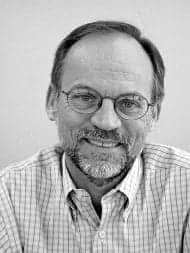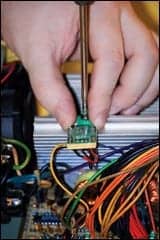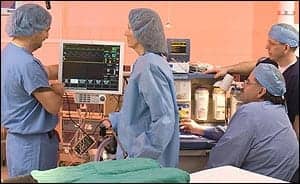
I have no doubt that there’s an advantage to growing up digital. But even better, I think, is growing up biomed.

Recognizing Douglas’s extraordinary mechanical aptitude with cars, a friend who was the director of the respiratory care department at Vanderbilt University Medical Center hired him to maintain the department’s equipment. Although that might seem like an unorthodox career transition now, medical equipment in those days, David says, “was pretty much all mechanical.” The medical device industry was still in its infancy, and it wasn’t unusual for devices to be invented and built by intrepid inventors.
In fact, Douglas himself invented a couple of devices for the respiratory department using his ingenuity and spare parts. One involved a Coleman ice cooler used for a croup tent, another a Sears jigsaw fitted with a suction cup for use in chest percussion therapy.
From an early age, David often accompanied his father to work, and grew up watching his father maintain medical equipment. Later on, his brother joined their father at Vanderbilt, as a cardiopulmonary biomed. But in 1980, when David was 15, tragedy struck the family. On his way to work, Douglas was killed in a car accident.
Two years later, after David graduated from high school and was preparing to attend college, he got a phone call from the Vanderbilt respiratory care director. Would he like to follow in his father’s footsteps and join the department as a biomed? He didn’t have to consider the offer very long—it was the natural thing to do.
After 6 years at Vanderbilt, David took an opportunity to join a respiratory sales and rental company, where he developed its biomedical services division (and, keeping things all in the family, eventually hired his brother to help out). Then in the late 1990s, he moved back into the clinical side, joining Saint Thomas Health in Nashville as a cardiopulmonary specialist. Again, his brother Steven followed him there a year later, joining the hospital’s clinical engineering team.
Like his father before him, David has a gift for invention that has resulted in a new medical device. In 2008, he recalls, he was watching several critical care staff helping an elderly patient walk with all her equipment, a process referred to by staff as “dragulation.” Thinking that there must be a better way, he began devoting his spare time to developing a device that would address the problem.
The prototype met with success at his hospital, and it has now evolved into several models of the Mobilizer Critical Care Ambulation Device, made by David’s company, Mobilizer Inc. The device is already in use, he says, at Vanderbilt, the Cleveland Clinic, Massachusetts General Hospital, and other facilities.
Reflecting on his career, David sees this latest development into an entrepreneur as “a really natural transition.” It is one logical outcome of growing up biomed. As he puts it, his new role is not about the money, but about helping patients. “I’m not a sales guy,” he says. “I’m Biomed Dave.” 24×7





